| Listing 1 - 10 of 23 | << page >> |
Sort by
|
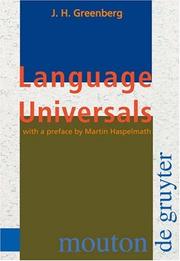
ISBN: 3110172844 3110899779 9783110899771 9783110172843 Year: 2005 Publisher: Berlin Mouton de Gruyter
Abstract | Keywords | Export | Availability | Bookmark
 Loading...
Loading...Choose an application
- Reference Manager
- EndNote
- RefWorks (Direct export to RefWorks)
"This is the latest version of the 1956 book which began the modern study of universals, and provides the foundation for many inquiries that followed. The hypotheses are cast at a moderate level of abstraction, and so are likely to survive as a basis for inquiry for many decades to come."Prof. Dr. William Labov
Linguistic universals. --- Universals (Linguistics). --- Universaliën (Taalwetenschap) --- Universals (Linguistics) --- Universaux (Linguistique) --- Linguistics --- Linguistics. --- Language and languages --- Linguistic science --- Science of language --- Universals --- Typology (Linguistics) --- linguistic typology. --- Universaux (linguistique)
Multi
ISBN: 9781107038516 9781139833899 Year: 2014 Publisher: Cambridge Cambridge University Press
Abstract | Keywords | Export | Availability | Bookmark
 Loading...
Loading...Choose an application
- Reference Manager
- EndNote
- RefWorks (Direct export to RefWorks)
Using data from a variety of languages such as Blackfoot, Halkomelem, and Upper Austrian German, this book explores a range of grammatical categories and constructions, including tense, aspect, subjunctive, case and demonstratives. It presents a new theory of grammatical categories - the Universal Spine Hypothesis - and reinforces generative notions of Universal Grammar while accommodating insights from linguistic typology. In essence, this new theory shows that language-specific categories are built from a small set of universal categories and language-specific units of language. Throughout the book the Universal Spine Hypothesis is compared to two alternative theories - the Universal Base Hypothesis and the No Base Hypothesis. This valuable addition to the field will be welcomed by graduate students and researchers in linguistics.
Grammar --- Linguistique structurale --- Catégories grammaticales --- Universaux (linguistique) --- Linguistique structurale. --- Catégories grammaticales.
Book
ISBN: 0713165138 9780713165135 Year: 1988 Publisher: London Arnold
Abstract | Keywords | Export | Availability | Bookmark
 Loading...
Loading...Choose an application
- Reference Manager
- EndNote
- RefWorks (Direct export to RefWorks)
Second language acquisition. --- Lerarenopleiding --- (vak)didactiek talen. --- Second language acquisition --- Second language learning --- Language acquisition --- Cognitive psychology --- Psycholinguistics --- Didactics of languages --- Linguistic universals. --- Langue seconde --- Universaux (Linguistique) --- Acquisition
Book
ISBN: 9789027211996 9789027211989 9789027273505 902721199X 9027211981 9027273502 1283539489 9786613851932 Year: 2013 Publisher: Amsterdam Benjamins
Abstract | Keywords | Export | Availability | Bookmark
 Loading...
Loading...Choose an application
- Reference Manager
- EndNote
- RefWorks (Direct export to RefWorks)
This clear and accessible introduction to linguistic typology covers all linguistic domains from phonology and morphology over parts-of-speech, the NP and the VP, to simple and complex clauses, pragmatics and language change. There is also a discussion on methodological issues in typology. This textbook is the first introduction that consistently applies the findings of the World Atlas of Language Structures, systematically includes pidgin and creole languages and devotes a section to sign languages in each chapter. All chapters contain numerous illustrative examples and specific featur
Linguistics --- Typology (Linguistics) --- Linguistic universals. --- Language and languages --- Universals (Linguistics) --- Grammar, Comparative and general --- Linguistic typology --- Linguistic universals --- Universals --- Typology --- Classification --- Typology (Linguistics). --- Typologie (Linguistique) --- Universaux (Linguistique)
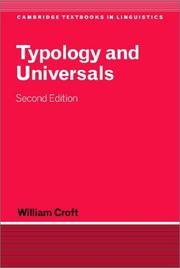
ISBN: 0521004993 0521808847 1316038041 0511840578 9780521004992 9780521808842 9780511840579 Year: 2006 Publisher: Cambridge Cambridge University Press
Abstract | Keywords | Export | Availability | Bookmark
 Loading...
Loading...Choose an application
- Reference Manager
- EndNote
- RefWorks (Direct export to RefWorks)
Comparison of the grammars of human languages reveals systematic patterns of variation. Typology and universals research uncovers those patterns to formulate universal constraints on language and seek their exploration. In this essential textbook, William Croft presents a comprehensive introduction to the method and theory used in studying typology and universals. The theoretical issues discussed range from the most fundamental to the most abstract. The book provides students and researchers with extensive examples of language universals in phonology, morphology, syntax and semantics. This second edition has been thoroughly rewritten and updated to reflect advances in typology and universals in the past decade, including: new methodologies such as the semantic map model and questions of syntactic argumentation; discussion of current debates over deeper explanations for specific classes of universals; and comparison of the typological and generative approaches to language.
Typology (Linguistics) --- Universals (Linguistics) --- Linguistic universals. --- Typology (Linguistics). --- Linguistics --- Linguistic universals --- 800.8 --- Grammar, Comparative and general --- Language and languages --- Linguistic typology --- 800.8 Taalklassen. Taalsoorten. Soorten talen. Talen: typologie --- Taalklassen. Taalsoorten. Soorten talen. Talen: typologie --- Typology --- Classification --- Universals --- Arts and Humanities --- Language & Linguistics --- Typologie (linguistique) --- Universaux (linguistique) --- Typologie (Linguistique) --- Universaux (Linguistique)
Book
ISBN: 1283399482 9786613399489 3110238063 3110238055 9783110238051 9783110238068 9781283399487 6613399485 Year: 2011 Publisher: Berlin De Gruyter Mouton
Abstract | Keywords | Export | Availability | Bookmark
 Loading...
Loading...Choose an application
- Reference Manager
- EndNote
- RefWorks (Direct export to RefWorks)
The volume explores the relationship between linguistic universals and language variation. Its contributions identify the recurrent patterns and principles behind the complex spectrum of observable variation. The volume bridges the gap between cross-linguistic variation, regional variation, diachronic variation, contact-induced variation as well as socially conditioned variation. Moreover, it addresses fundamental methodological and theoretical issues of variation research. The volume brings together internationally renowned specialists of their fields while, at the same time, offering a platform for gifted and highly talented young researchers. The authors come from different theoretical backgrounds and through their work illustrate a rich array of scientific methods. All authors share a strong belief in empirically founded theoretical work. The contributions span a high number of languages and dialects from many parts of the world. They are extremely broad in their empirical coverage addressing an impressive selection of grammatical domains.
Language and languages --- Linguistic universals. --- Variation. --- Dialectology --- Linguistic universals --- Variation (Linguistique) --- Universaux (Linguistique) --- Universals (Linguistics) --- Characterology of speech --- Language diversity --- Language subsystems --- Language variation --- Linguistic diversity --- Variation in language --- Universals --- Linguistics --- Typology (Linguistics) --- Variation --- Language Contact. --- Sociolinguistics. --- Typology.
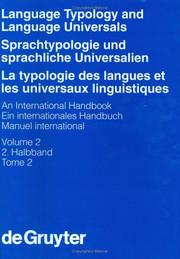
ISBN: 3110114232 3110171546 9786612193569 1282193562 3110194260 9786612193354 128219335X 3110194031 9783110194265 9783110171549 9783110194036 9783110114232 Year: 2001 Volume: 20 20 20 Publisher: Berlin de Gruyter
Abstract | Keywords | Export | Availability | Bookmark
 Loading...
Loading...Choose an application
- Reference Manager
- EndNote
- RefWorks (Direct export to RefWorks)
This series of HANDBOOKS OF LINGUISTICS AND COMMUNICATION SCIENCE is designed to illuminate a field which not only includes general linguistics and the study of linguistics as applied to specific languages, but also covers those more recent areas which have developed from the increasing body of research into the manifold forms of communicative action and interaction.For ""classic"" linguistics there appears to be a need for a review of the state of the art which will provide a reference base for the rapid advances in research undertaken from a variety of theoretical standpoints, while in the m
800.8 --- Typology (Linguistics) --- Universals (Linguistics) --- Language and languages --- Grammar, Comparative and general --- Linguistic typology --- 800.8 Taalklassen. Taalsoorten. Soorten talen. Talen: typologie --- Taalklassen. Taalsoorten. Soorten talen. Talen: typologie --- Universals --- Typology --- Linguistic universals --- Linguistics --- Classification --- Typologie (linguistique) --- Universaux (linguistique)
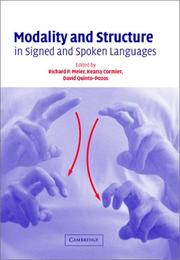
ISBN: 0521803853 0521112583 1107130883 0511178077 0511041616 0511148593 0511330421 0511486774 1280433345 0511043856 9780511041617 9780511486777 9781280433344 9786610433346 6610433348 9780521803854 9780511043857 9780521112581 Year: 2002 Publisher: Cambridge New York Cambridge University Press
Abstract | Keywords | Export | Availability | Bookmark
 Loading...
Loading...Choose an application
- Reference Manager
- EndNote
- RefWorks (Direct export to RefWorks)
The realisation that signed languages are true languages is one of the great discoveries of linguistic research. The work of many sign language researchers has revealed deep similarities between signed and spoken languages in their structure, acquisition and processing, as well as differences, arising from the differing articulatory and perceptual constraints under which signed languages are used and learned. This book provides a cross-linguistic examination of the properties of many signed languages, including detailed case studies of Hong Kong, British, Mexican and German sign languages. The contributions to this volume, by some of the most prominent researchers in the field, focus on a single question: to what extent is linguistic structure influenced by the modality of language? Their answers offer particular insights into the factors that shape the nature of language and contribute to our understanding of why languages are organised as they are.
Gesture --- Modality (Linguistics) --- Sign language --- #KVHA:Taalkunde; Gebarentaal --- #KVHA:Modaliteit --- #KVHA:Structuur --- Deaf --- Gesture language --- Mudra --- Linguistics --- Acting --- Body language --- Elocution --- Movement (Acting) --- Oratory --- Arts and Humanities --- Language & Linguistics --- Typologie (linguistique) --- Universaux (linguistique)
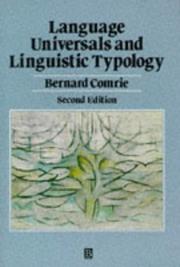
ISBN: 063112618X 0631129715 0631162569 9780631126188 9780631129714 Year: 1981 Publisher: Oxford Blackwell
Abstract | Keywords | Export | Availability | Bookmark
 Loading...
Loading...Choose an application
- Reference Manager
- EndNote
- RefWorks (Direct export to RefWorks)
Grammar, Comparative and general --- Historical linguistics --- Linguistic universals --- Typology (Linguistics) --- Language and languages --- Linguistic typology --- Linguistics --- Universals (Linguistics) --- Diachronic linguistics --- Dynamic linguistics --- Evolutionary linguistics --- Language and history --- Comparative grammar --- Grammar --- Grammar, Philosophical --- Grammar, Universal --- Philosophical grammar --- Philology --- Typology --- Classification --- Universals --- History --- Grammar, Comparative --- 801.56 --- 801.56 Syntaxis. Semantiek --- Syntaxis. Semantiek --- Grammar, Comparative and general. --- Historical linguistics. --- Linguistic universals. --- Typology (Linguistics). --- Universaux (Linguistique) --- Typologie (Linguistique) --- Grammaire comparée et générale --- Linguistique historique --- Typologie (linguistique) --- Universaux (linguistique)
Book
ISBN: 9789027248411 9789027273666 9027248419 9027273669 1281145971 9781281145970 9786613776709 661377670X Year: 2012 Publisher: Amserdam Philadelphia John Benjamins Pub. Co.
Abstract | Keywords | Export | Availability | Bookmark
 Loading...
Loading...Choose an application
- Reference Manager
- EndNote
- RefWorks (Direct export to RefWorks)
The origins of sound change is one of the oldest and most challenging questions in the study of language. The goal of this volume is to examine current approaches to sound change from a variety of theoretical and methodological perspectives, including articulatory variation and modeling, speech perception mechanisms and neurobiological processes, geographical and social variation, and diachronic phonology. This diversity of perspectives contributes to a fruitful cross-fertilization across disciplines and represents an attempt to formulate converging ideas on the factors that lead to sound chan
Grammar, Comparative and general --- Linguistic universals --- Language and languages --- Linguistic change. --- Sociolinguistics. --- Phonologie --- Universaux (Linguistique) --- Variation (Linguistique) --- Changement linguistique --- Sociolinguistique --- Phonology. --- Variation. --- Grammaire --- Universaux (linguistique) --- Variation linguistique --- Linguistic universals. --- Articulatie. --- Diachronische fonologie. --- Geluid. --- Klankverschuiving. --- Grammar, Comparative and general -- Phonology. --- Language and languages -- Variation. --- Linguistic change --- Sociolinguistics --- Languages & Literatures --- Philology & Linguistics --- Phonology --- Variation --- Language and society --- Society and language --- Sociology of language --- Language and culture --- Linguistics --- Sociology --- Integrational linguistics (Oxford school) --- Universals (Linguistics) --- Typology (Linguistics) --- Change, Linguistic --- Language change --- Historical linguistics --- Characterology of speech --- Language diversity --- Language subsystems --- Language variation --- Linguistic diversity --- Variation in language --- Social aspects --- Sociological aspects --- Universals --- Phonologie. --- Philology --- Grammar, Comparative and general Phonology
| Listing 1 - 10 of 23 | << page >> |
Sort by
|

 Search
Search Feedback
Feedback About UniCat
About UniCat  Help
Help News
News